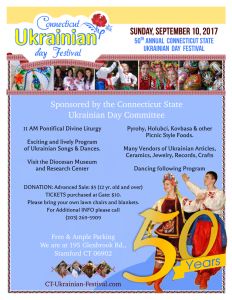
Divine Liturgy for the coming week
Glory to Jesus Christ
Sunday, 8/13/17 10th Sunday after Pentecost —Venerable Father Maximus the Confessor
8:00 a.m. For the people of the parish
Epistle: 1 Corinthians 4:9-16
Gospel: Matthew 17:14-23, Tone 1
Monday, 8/14/17 Transfer of the Precious Relics of Our Venerable Father Theodosius
8:00 a.m. no special intention for the Divine Liturgy
Tuesday, 8/15/17 Dormition of the Mother of God – (Holy Day of obligation)
10:00 a.m. Special Intention
Blessing of fragrant herbs and flowers
7:00 p.m. For the people of the parish
Blessing of fragrant herbs and flowers
Wednesday, 8/16/17 Holy Martyr Diomedes
8:00 a.m. no special intention for the Divine Liturgy
Thursday, 8/17/17 Holy Martyr Myron
8:00 a.m. no special intention for the Divine Liturgy
Friday, 8/18/17 Holy Martyrs Florus and Laurus
8:00 a.m. no special intention for the Divine Liturgy
Saturday, 8/19/17 Holy Martyr Andrew the General and companions
9:00 a.m. no special intention for the Divine Liturgy
Sunday, 8/20/17 11th Sunday after Pentecost —Holy Prophet Samuel
9:00 a.m. For the people of the parish
10:30 a.m. God’s blessing & health for Anna Mazur requested by Stefania Sadiwsky
Epistle: 1 Corinthians 9:2:12
Gospel: Matthew 18:23-35, Tone 5
Parish announcements this week
Christ is in our midst!
1. VIGIL LIGHT: This week vigil light is offered to the honor of God in memory of Henriette Hartig who fell asleep in the Lord by Christopher Komondy
2. AFTER DIVINE LITURGY: Dear parishioners and guests, after each Divine Liturgy, coffee and hard rolls are available in the church hall.
3. FOOD DRIVE: Judy Ellis leads the mercy project which provides food items to the needy. A container is in our church vestibule for non-perishable food. This collection will be taken every week. Father Iura will distribute the food to those in need. Thanks for your generous support.
4. DORMITION BLESSING: Neither the tomb, nor death, could hold the Theotokos, who is constant in prayer and our firm hope in her intercessions. For being the Mother of Life, she was translated to life, by the One who dwelt in her virginal womb (Kontakion for the Dormition).
As part of our celebration of Dormition on Tuesday, August 15, we will bless herbs and flowers for use in the home. Please bring herbs and flowers to Divine Liturgy (10:00 a.m. and at 7:00 p.m.). As a point of liturgical fact, the Church asks God to bless herbs and flowers –and thus us– to remind all of us of the gifts God has given us for our sustenance, healing and beauty.
Holy Tradition educates us that all the Apostles, except St. Thomas who was late, were transported mystically to Jerusalem in order to be with the Mother of God – the Theotokos – as she reposed, and to given her a burial. When Thomas arrived the next day, the Apostles opened the tomb so that he could kiss Mary farewell. The opened tomb revealed that the body of the holy Virgin of Mother of God was missing, and filled with herbs and flowers. This event was a sure sign of her great purity and holiness.
What happens to Mary happens to all of us who imitate her holy life of humility, obedience, and love.
5. UKRAINIAN INDEPENDENCE DAY: Will be celebrated this year on Sunday, August 27, 2017. The Divine Liturgy will be celebrated at 10:00 a.m. A Proclamation Ceremony will take place on the New Haven Green at noon. The Annual Independence day picnic will commence at 1:00 p.m. at the Church Hall and Church garden. All are invited to attend. Saint Mary’s Ukrainian Orthodox Church will celebrate their mass at 10:00 a.m. and join us on the New Haven Green and at our picnic afterwards.
Blessing herbs and flowers on the Dormition, August 15
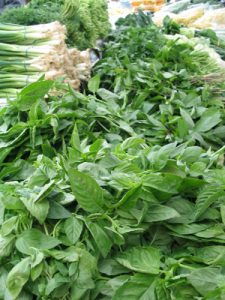 Neither the tomb, nor death, could hold the Theotokos, who is constant in prayer and our firm hope in her intercessions. For being the Mother of Life, she was translated to life, by the One who dwelt in her virginal womb (Kontakion for the Dormition).
Neither the tomb, nor death, could hold the Theotokos, who is constant in prayer and our firm hope in her intercessions. For being the Mother of Life, she was translated to life, by the One who dwelt in her virginal womb (Kontakion for the Dormition).
As part of our celebration of Dormition on Tuesday, August 15, we will bless herbs and flowers for use in the home. Please bring herbs and flowers to Divine Liturgy (10:00 a.m. and at 7:00 p.m.). As a point of liturgical fact, the Church asks God to bless herbs and flowers –and thus us– to remind all of us of the gifts God has given us for our sustenance, healing and beauty.
Holy Tradition educates us that all the Apostles, except St. Thomas who was late, were transported mystically to Jerusalem in order to be with the Mother of God – the Theotokos – as she reposed, and to given her a burial. When Thomas arrived the next day, the Apostles opened the tomb so that he could kiss Mary farewell. The opened tomb revealed that the body of the holy Virgin of Mother of God was missing, and filled with herbs and flowers. This event was a sure sign of her great purity and holiness.
What happens to Mary happens to all of us who imitate her holy life of humility, obedience, and love.
Andriy Rabiy appointed new auxiliary bishop of archieparchy of Philadelphia
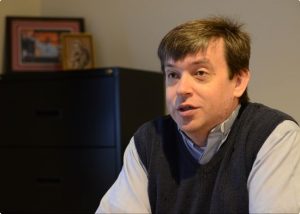 Today, the Holy Father appointed Father Andriy Rabiy as an auxiliary bishop of the archieparchy of Philadelphia of the Ukrainians. He was assigned Father Andriy Rabiy the titular see of Germaniciana; he is currently protosyncellus (Vicar General) of the same archieparchy.
Today, the Holy Father appointed Father Andriy Rabiy as an auxiliary bishop of the archieparchy of Philadelphia of the Ukrainians. He was assigned Father Andriy Rabiy the titular see of Germaniciana; he is currently protosyncellus (Vicar General) of the same archieparchy.
The bishop-elect is the youngest US bishop.
Father Andriy Rabiy was born in Lviv, Ukraine on 1 October 1975. He transferred to the United States and received his priestly formation in the Ukrainian St. Josaphat Seminary in Washington. In 1999 he obtained a Bachelor’s degree in philosophy from the Catholic University of America, in 2002 a Master’s degree in theology from the Theological Studium of the Dominican Fathers of Washington; and in 2008 a licentiate in canon law from the Catholic University of America.
He was ordained a deacon on 15 November 1998 and a priest on 19 December 2001. He currently holds pastoral offices in the archieparchy of Philadelphia of the Ukrainians; he has served as protosyncellus, vice chancellor, member of the archieparchial college of consulters, member of the managing board of the Conference of Catholic Bishops of Pennsylvania, member of the archieparchial presbyteral council, and director of the centre for childhood and youth protection. (VIS)
Blessing fruits today
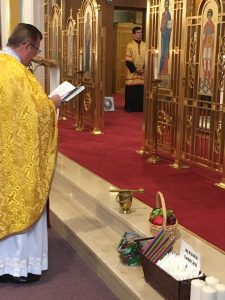 As the Apostles recognized, “it is good for us to be here”.
As the Apostles recognized, “it is good for us to be here”.
Fr. Iura blessed fruits for the feast of the Transfiguration.
Happy Sunday!
A Peaceful and Confident Voice: Lubomyr Husar
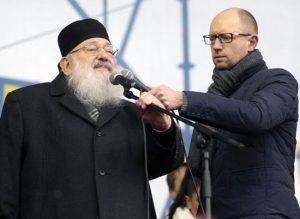 Our parishioner and KofC brother, John Burger, penned an article for Columbia magazine (the monthly publication of the Knights of Columbus). John’s article, “A Peaceful and Confident Voice” features the life and work of the late Patriarch-cardinal-monk Lubomyr Husar who died on May 31.
Our parishioner and KofC brother, John Burger, penned an article for Columbia magazine (the monthly publication of the Knights of Columbus). John’s article, “A Peaceful and Confident Voice” features the life and work of the late Patriarch-cardinal-monk Lubomyr Husar who died on May 31.
Divine Liturgy for the coming week
Glory to Jesus Christ
Sunday, 8/06/17 9th Sunday after Pentecost – Transfiguration of the Lord, God and Savior Jesus Christ
9:00 a.m. +Anna Muryn requested by Michael and Mary Muryn
Blessing of grapes and other fruit
10:30 a.m. For the people of the parish
Blessing of grapes and other fruit
Epistle: 2 Peter 1:10-19
Gospel: Matthew 17:1-9, Tone 8
Monday, 8/07/17 Holy Venerable-martyr Dometius
8:00 a.m. no special intention for the Divine Liturgy
Tuesday, 8/08/17 Holy Confessor Emilian
8:00 a.m. no special intention for the Divine Liturgy
Wednesday, 8/09/17 Holy Apostle Matthias
8:00 a.m. no special intention for the Divine Liturgy
Thursday, 8/10/17 Holy Martyr and Archdeacon Lawrence
8:00 a.m. no special intention for the Divine Liturgy
Friday, 8/11/17 Holy Martyr Euplus
8:00 a.m. no special intention for the Divine Liturgy
Saturday, 8/12/17 Holy Martyrs Photius and Anicetas
9:00 a.m. no special intention for the Divine Liturgy
Sunday, 8/13/17 10th Sunday after Pentecost — Leave-taking of the Feast of the Holy Transfiguration
8:00 a.m. For the people of the parish
Epistle: 1 Corinthians 4:9:16
Gospel: Matthew 17:14-23, Tone 1
Parish announcements this week
Christ is in our midst!
1. WELCOME ALL NEW PARISHIONERS! New parishioners are always welcome in our parish. If someone wishes to join, please contact Father Iura Godenciuc at 203 865-0388 or our financial secretary Natalie Chermak at 203-468-0367.
2. AFTER DIVINE LITURGY: Dear parishioners and guests, after each Divine Liturgy, coffee and hard rolls are available in the church hall.
3. The vigil light in the sanctuary is NOT memorialized this week.
4. FOOD DRIVE: Judy Ellis leads the mercy project which provides food items to the needy. A container is in our church vestibule for non-perishable food. This collection will be taken every week. Father Iura will distribute the food to those in need. Thanks for your generous support.
5. PARISH COUNCIL MEETING: Will take place on Monday, August 7, 2017 at 6:00 p.m., In the church hall. Main Topic: Coordinate with the KofC plans for the Independence Day Picnic. Other topics: physical plant improvements, hall rentals. All are invited to attend.
6. PARISH COUNCIL: Natalie Chermak, Nataliya Lyalka, Andrew Bamber, Anna Salemme, Walter Ushchak, Halya Lodynsky, Marybeth Gawron, Christine Melnyk, Myron Melnyk, Maria Antonyshyn, Michael Muryn, and Carl Harvey.
7. KofC: The Knights of Columbus Blessed Metropolitan Andrey Sheptytsky Ukrainian Council will hold its next regular meeting on Monday, August 7, 2017 at 7:00 p.m. in the church hall. All men of parish are invited to attend to see what the Knights are all about and what they do and what you can do with them for your parish.
8. ROOF REPAIR: The sacristy roofs repair has been completed. New framing for the edges and proper flashing has been installed. The damaged air conditioner supports have been replaced and the wiring has been updated. The cold air ducts have been insulated and refastened. A service for the air conditioners is being scheduled.
9. ROOF REPAIR FUND ROOF, CAPITAL IMPROVEMENT PLEDGES: Please consider the immediate as well as the long term repair capital improvement projects that are being planned, both now and the future and make a generous contribution to allow us to protect our property. The Church hall roof which is 34 years old has developed major leaks. Most of the other roofs especially the Sacristy roof has serious problems. These roofs must be repaired to prevent further water damage to our property and we cannot pay for them from regular weekly collection. Roof Repair Fund envelopes as well as the long term Pledge forms are available in the vestibule of our church for your special sacrificial gift. Thank you for helping to keep our physical structures in good condition for our use today and for the next generation tomorrow.
Blessing grapes on Transfiguration Sunday
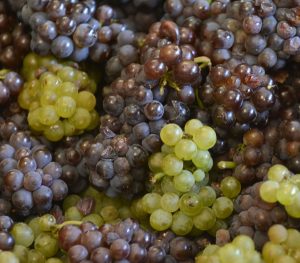 At both of the Divine Liturgies (9 and 10:30am) Father Iura will bless grapes and other fruit on Transfiguration Sunday, August 6.
At both of the Divine Liturgies (9 and 10:30am) Father Iura will bless grapes and other fruit on Transfiguration Sunday, August 6.
Bring grapes and fruit to observe the feast of the Transfiguration of the Lord.
Why bless grapes on this day?
On the mountain You were transfigured, O Christ God, and Your disciples beheld Your glory as far as they could see it; so that when they would behold You crucified, they would understand that Your suffering was voluntary, and would proclaim to the world that You are truly the Radiance of the Father (Kontakion for the Transfiguration).
The Transfiguration of Our Lord, as testified to in Divine Revelation shows us our ultimate destiny as Christians: the ultimate destiny of all men and all creation to be transformed and glorified by the splendor of God Himself.
The feast of the Transfiguration on Sunday, August 6th, is a summer celebration and expectation of Great Lent, of the Eucharist, the Cross, and the Resurrection. The Church blesses grapes, as well as other fruits, on the Transfiguration is a beautiful sign of our final transfiguration of all things in Jesus Christ. This is a very ancient observance. We bless grapes because we bless God! The gesture of bringing and blessing of grapes points to the ultimate flowering and fruitfulness (generativity) of all creation in the Paradise; here we all will be transformed in the garden by the glory of the Lord.
Bunches of grapes are symbols of completion —especially experienced in the completion of the growing season— which has finally brought things to fruition. Christians see in the grapes the biblical image of Jesus as the Vine.
In the Bible we read of the custom of bringing fruit to the temple for consecration (Genesis 4:2-4; Ex 13:12-13; Numbers 15:19-21; Deuteronomy 8:10-14). In the New Testament the 12 Apostles brought this tradition to the Church (1 Corinthians 16:1-2). Later in the early centuries of Christianity, the faithful brought to the Church fruits and vegetables of the new harvest: bread, wine, oil, incense, wax, honey, etc. Some of the offerings were taken to the altar, and the balance made available to needs of the clergy and the poor.